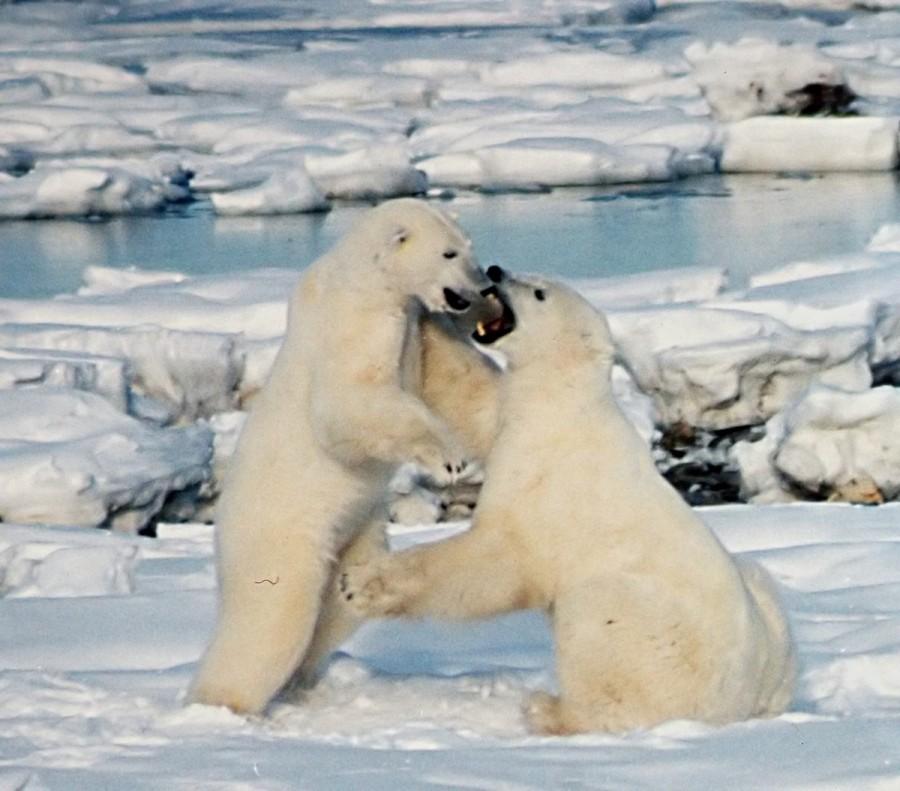Mammals with Attitude
The mighty Ursus Arctos, a culmination of speed, strength and utter hormones. No land mammal in the animal kingdom physically matches up to the absolute beast that is the brown bear. Weighing in at 2,500 pounds and standing more than nine feet tall, this physical specimen brings more than just size to the fight. They are fast, having been clocked in at up to 30 miles per hour, and they can maintain that speed for long periods of time while chasing down their hopeless prey.
Their versatility is what puts them on the next level though. They can climb, jump, swipe, and bite in order to get the upper hand on their victims. With 6 inch claws and the brute strength to put those bad boys to use, the Grizzly basically has ten lethal knives attached to its already massive paws. A human head does not stand a fighting chance against one swipe of the claw and a grizzly bear could cut clean through a neck like a hot knife through butter.
While their physical stature may be intimidating, the loving gentle nature of most bears leaves them as nothing more than a gentle giant. These omnivores are counted off as vicious beasts because of one or two attacks a year that are overwhelmingly instigated by the member of the homosapien family. Human flesh is hardly their meal of choice, any meat in fact, is not remotely close to deserving of such a title. When it comes to truly pleasing their massive palate, nothing does a better job than berries and seeds. Even in their own habitat, all bears including the deadly Kodiak and Grizzly bear, will avoid any confrontation with humans, especially a violent one. And yes, it is their habitats as both brown bears and polar bears are the apex predator of their respective territory.
This brings up the long-asked and every longing question of who would win in a fight, a brown bear (which includes Grizzlies and Kodiaks) or a polar bear. Two apex predators, with specific skill sets that seem to be the perfect match for the other, two absolutely massive and jaw dropping animals, and “urologists” are left incapacitated by such a thought. This very question haunts bear experts like Esther Arkel, who favors the Polar bear’s “nastier reputation than Grizzlies”(Io9.com), but believes that a Kodiak bear will pose a larger threat than the Grizzly. While it is easy to put the money on the great white bear of the North because of its size advantage and its feisty personality, better judgement may point to the brown bear’s speed and claws better suited for fighting, so long as the encounter does not occur on ice.
While this argument may seem meaningless and arbitrary, some climate experts worry that the melting polar caps may lead to Grizzlies and other bears migrating North, confusing the polar bear’s territory for its own because of the absence of ice. Polar bears, like many of its fellow inhabitants of the North Pole, could not acquire the proper resources to survive without ice. A move into one another’s land and the competition over food would prove devastating for both species that need no further adversity in their fight against extinction. However, hunters in the North still feel the need to show their testosterone by shooting these well-natured mammals that have no desire to harm a human. More threatening than these farmers are the millions and millions of people who either dispute overwhelming scientific research on climate change, or blatantly refuse to do something about it. Among the countless issues that climate change poses to our world is the loss of polar bears, whose demise will be inevitable if we do not take responsibility for our actions as a species. While losing a truly remarkable bear is hardly held on the same level of evil as other consequences of climate change, it is just another species on the countless list of animals that will either be killed off or tremendously devastated by the effects of climate change.
Even more bothersome than their potential extinction is humanity’s lack of concern. We sit idly by while an astonishing being fades away because those willing to make a substantial sacrifice for this issue stand as an overwhelming minority on our planet. Our countries disconcern for the bear’s well-being comes in large part from fear of them, despite the virtually impossibility of being attacked by one. Next time you are at your dinner table having a meal with your family that you trust so dearly, maybe you should have a similar fear around them, because you are around 400 times more likely to be killed by someone in your immediate family than by a bear (prisonlegalnews.org). So this fear leading to not caring about the survival of bears is bafflingly illogical.
This is not to say you should not respect their capability to decapitate a human effortlessly. Bears are a wonderful and versatile giant that deserve to be protected by mankind. After all, if bears had the mental capacity to realize how many of their kind we kill one way or another, the amount of human deaths caused by bears would most likely grow exponentially.

Although my birth name is Ryan Henley, I am most commonly known as Bear Claw and Rhino. The origins of those aliases are known to few, and those who have...














Maddy Flicker • Apr 15, 2015 at 8:24 am
Good to know my family is more likely to kill me! Great article
Nikol Podlacha • Apr 15, 2015 at 8:09 am
Honestly this article is one for the ages, you have given me a new outlook on bears that has changed my life forever. Bravo.
I am starting to believe that maybe, just maybe a bear could be able to take down ten baboons.
Katie Rainsberger • Apr 15, 2015 at 8:04 am
Ryan, your obvious infatuation with bears is quite delightful and surprisingly refreshing. An amazing article and author. Way to go!